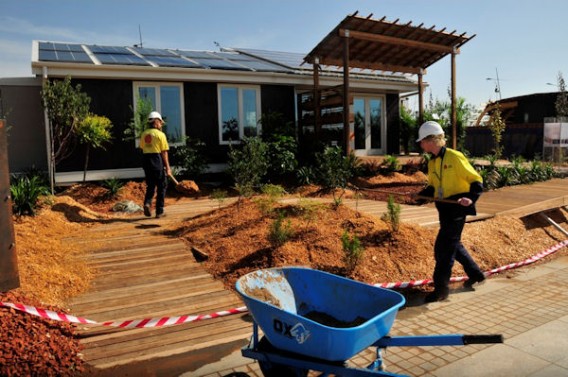
Winners of the Solar Decathlon China 2013, Team UOW (of University of Wollongong and TAFE Illawarra Institute) was the first Australian team to have ever won a place in a Solar Decathlon final and was the largest student-run competition that the UoW has ever entered.
Hosted by the United States Department of Energy, the Chinese National Energy Administration, and Peking University, Solar Decathlon China 2013 challenged 24 teams from 14 countries to design, build, and operate a solar-powered home that is energy efficient, cost effective to build, and appealing. Categories in which entries are judged include architecture, engineering, solar application, energy balance, market appeal, home entertainment, and appliances.

The mission of Team UOW was to inspire Australian to adopt sustainable retrofit technologies by removing financial and social barriers to their implementation, particularly for older generations.
Because the eight million homes in Australia make up about 13 percent of the country’s carbon dioxide emissions, Team UOW began with the idea of retrofitting an unsustainable Australian “fibro” house (a common housing type in Australia that is constructed with fiber cement sheets) to become the first retrofit of an existing structure to compete in the Solar Decathlon.
Team UOW set about designing Illawarra Flame House (named for the Illawarra Flame tree that seasonally transforms and renews itself) for an older couple that is coming up on retirement and wanting downsize their living space. The original, eighty square meter, three-bedroom home was transformed into an attractive, sustainable, net zero house that produces more energy than it consumes..
Using second-generation, poly-crystalline photovoltaic panels that were donated by sponsor BlueScope Steel, Team UOW designed a dual system to maximize the efficiency of solar power generation. Their use of locally available solutions gained acclaim from the architecture jurors who called it “modest and humble, yet innovative.” Reclaimed and recycled materials were incorporated into the home’s construction, including materials that were sourced from the original home.
A bedroom was converted into a living and dining area, with bi-fold windows and doors opening the entire house up to nature. Passive orientation maximizes solar radiation during the winter and minimizes it during the summer. A thermal wall contributes to warming the interior in winter months as it absorbs heat from the sun’s rays that enter through a window.
Landscaping incorporates indigenous plants, some of which are drought-resistant and do not need additional watering. Green walls that are constructed from recycled timber with a cascading water system facilitate urban food production.
The next Solar Decathlon will be held in early October 2013, in Irvine, California.


video embed code:
Related Articles on JetsonGreen.com:
Ecohabit Smart Home Vies for 2013 Solar Decathlon Recognition
ABC Green Home Wins Best Zero Net Energy Home Design at PCBC 2013 Golden Nugget Awards
Eagle Ridge Does Much with Little and Wins 2013 AIA Housing Award

Leave a Reply
You must be logged in to post a comment.